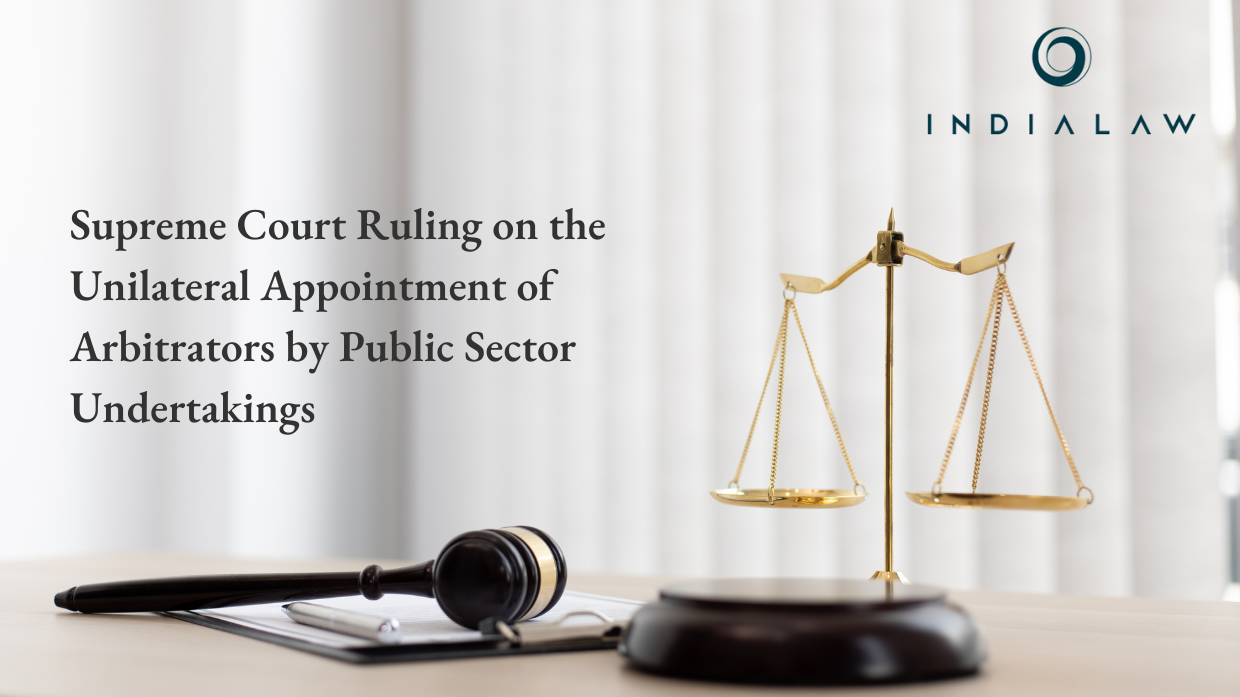Supreme Court Ruling on the Unilateral Appointment of Arbitrators by Public Sector Undertakings

Introduction
The Supreme Court of India delivered the much-awaited judgment dealing with the arbitration clauses that deals with the unilateral appointment of the Arbitrators by Public Sector Undertakings (PSUs). On 8th November 2024 the Constitution Bench compromising of Justice Shri Pankaj Mittal, Justice Shri Hrishikesh Roy, Justice Shri P S Narasimha, Justice Shri Manoj Mishra led by Chief Justice DY Chandrachud held that while PSUs may maintain a panel of potential arbitrators, they cannot compel a contesting party to appoint an arbitrator from the curated panel. This ruling underscores the principle of equality and fairness in arbitration proceedings, with significant implications for future arbitration clauses in public-private contract.
Table of Contents
Factual background
The Law Commission of India in its 246th Report emphasized that while party autonomy in arbitration is important, it should not override the fundamental principles of impartiality and independence in the arbitral process, especially when appointing the arbitrator/s. Specifically, “party autonomy must not allow the selection of arbitrators in a manner that compromises the fairness of the proceedings”. This issue had mounted in various other Supreme Court cases.
In Voestalpine Schienen GmbH v. Delhi Metro Rail Corporation Ltd the Delhi Metro Rail Corporation (DMRC) being a government entity formed a panel of government engineers for arbitration, which is in violation of Section 12 of the Arbitration and Conciliation Act, 1996 (Act).
In TRF Ltd. v. Energo Engineering Projects Ltd. the purchase order required the sole arbitrator to be the Managing Director or their nominee. Herein the court held that an individual with a vested interest in the outcome of the dispute, such as the Managing Director, could not be eligible to nominate the sole arbitrator, as it would violate the principle of impartiality.
In Perkins Eastman Architects DPC v. HSCC (India) Ltd. this case similarly involved a clause where the CMD of HSCC would appoint a sole arbitrator. The Court decided that a person with an interest in the outcome of the dispute should not have the power to appoint an arbitrator, as it could lead to biasness.
In Central Organisation for Railway Electrification v. ECI-SPIC-SMOMCML (JV) the arbitration clause here involved retired railway officers as arbitrators. Section 12(5) does not bar former employees of a party from being appointed as arbitrators, provided there is no conflict of interest.
These cases demonstrated the necessity of ensuring that arbitrators are independent and impartial, especially when the appointment process could be seen as biased or influenced by one of the parties. Hence, the present matter was brought before the Constitution Bench for comprehensive examination.
Contentions by the both the side
The counsel for Appellant (Union) mainly argued that Section 11(2) allows one party to propose a panel of arbitrators from which the other party can select a nominee, and that the roles of “appointing” or “enlisting” an arbitrator differ from “acting” as an arbitrator, as the Act does not restrict an ineligible person from appointing an arbitrator or enlisting a panel of arbitrators. Section 12 requires that ineligibility of arbitrators be actual, not assumed, further, equality principle under Section 18 does not imply equal standing between parties when determining a procedure for appointment. It was argued that Voestalpine (supra) correctly allowed the use of a panel of arbitrators by public sector entities, whereas TRF (supra) erred as appointment under an arbitration clause is not a delegation of power as arbitrator exercises his authority within the limits of the agreement.
The counsel for Respondent opined that autonomy must be balanced with the mandatory provisions set forth in the Arbitration Act, particularly Sections 12(5) and 18, in order to safeguard the independence and impartiality of the arbitration process. The Counsels contended that party autonomy being a fundamental principle, must be subject to the mandatory provisions of the Arbitration Act, including Section 18 (equal treatment of parties) and Section 12(5) (independence and impartiality). The lack of impartiality and violation of these principles arise as a panel of arbitrators is unilaterally controlled by one party.
Observations (key takeaways)
- Equal treatment of the parties
The principle of equal treatment of parties applies at all stages of arbitration proceedings, including the first stage viz of appointment of arbitrators under section 11 of the Arbitration and Conciliation Act, 1996 (“Arbitration Act”). It is imperative to ensure that the Arbitrator/s are impartial and independent while adjudicating the disputes between both the parties. The appointment of arbitrator/s must cautiously be made through fair consent of both parties. In the appointment of a three-member panel mandating the other party to select its arbitrator from a curated panel of potential arbitrators is against the principle of equal treatment of parties. In this situation, there is no effective counterbalance because parties do not equally participate in fairly appointing the arbitrator/s.
- PSUs and Impanelling Arbitrators
The Arbitration Act does not prohibit PSUs from impanelling potential arbitrators. However, an Arbitration clause cannot require the other party to solely select its arbitrators from the panel curated to maintain the fairness. The same is perceived as a violation of the principle of equal participation of both the parties in the appointment process.
- Violation of Article 14 of the Constitution
The Supreme Court found that unilateral appointment clauses in contracts between PSUs and private entities are in violation of Article 14 of the Constitution, which guarantees the right to equality before the law. This to prevent any unwarranted benefit being given to one party in the appointment of the arbitrator, especially when the arbitrator is appointed with resolving disputes between unequally positioned entities.
- Waiver of Bias Allegations
The Supreme Court simplified that the principle of express waiver under Section 12(5) of the Arbitration Act applies to cases where a party waives allegations of bias against an arbitrator unilaterally appointed. The Supreme Court further noted that such a waiver must be voluntary and unequivocal. The same is to ensure fairness of the arbitral procedure.
Conclusion
The statutory safeguards under the Arbitration Act provide a checklist and accounts the balance and thereby rule out inequality for the advocating parties. Concerns about alleged bias of an arbitrator nominated by the claiming party must also be tested against the objective standard of impartiality and independence provided under seventh schedule of the Act. The Supreme Court has pursued to strengthen the integrity of the arbitration as alternative dispute resolution. The landmark judgement assists as a reminder the arbitration must remain fair and impartial process that maintains the fundamental rights of the parties involved.
By entering the email address you agree to our Privacy Policy.



